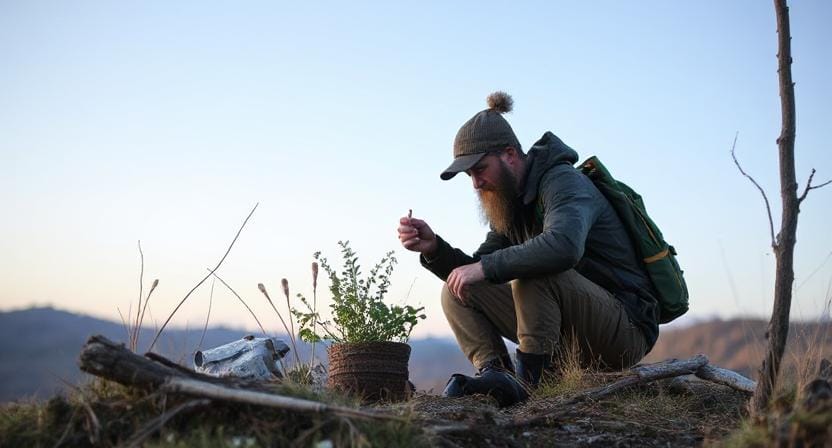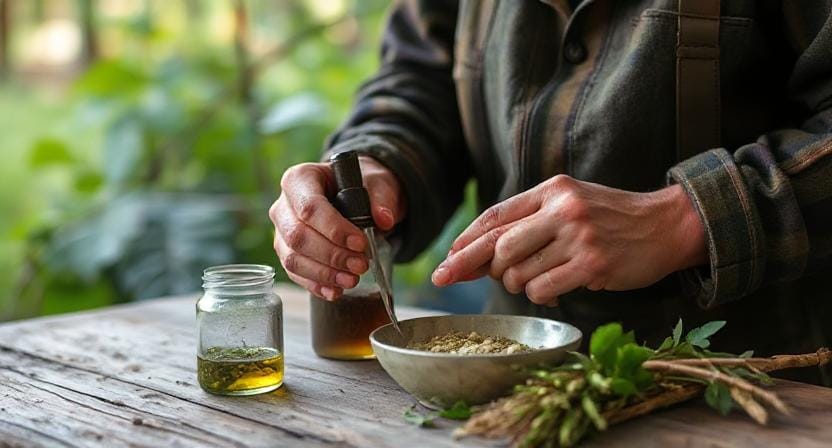Last Updated on November 1, 2025 by Kevin Collier

Top Takeaways and Key Concepts
- Learn Herbal Basics: Use leaves, roots, flowers, and seeds to relieve pain and ailments.
- Keep Key Herbs Accessible: Grow or carry peppermint, chamomile, lavender, ginger, turmeric, and willow bark.
- Prepare Simple Remedies: Make infusions, tinctures, salves, or powders for scrapes, aches, and digestion.
- Follow Safe Dosages: Consult a doctor and note individual responses to avoid adverse effects.
- Integrate Herbs into Daily Life: Add fresh herbs to food, teas, and home remedies for ongoing benefits.
Picture this: you’re out in the wild, soaking in all that fresh air, and then—bam! You trip over a sneaky root and find yourself face-first in a big pile of leaves. Not just any leaves. The kind that’s been there long enough to have tiny bugs chattering about their day.
While you’re lying there, maybe feeling a little embarrassed, it hits you. Wouldn’t it be amazing to have some herbal remedies right there? Just a few good plants could help you feel better fast.
Please Note: This post may contain affiliate links. If you click one of them, we may receive a commission at no extra cost to you. As an Amazon Associate, I earn from qualifying purchases.
Let’s chat about herbal medicine. Plants can be your best friends. They can help with scrapes, bruises, and even some grumpy tummy feelings. How cool is that?
Ever heard of peppermint? It’s great for tummy aches. Just imagine chewing on a few leaves or sipping tea made from it. So refreshing!
And then there’s chamomile. It’s like a cozy hug in a cup. Perfect for calming down after that trip-and-fall moment. You’d be sipping that and feeling all zen again.
Got a little cut? Lavender is your buddy. It smells nice and can help things heal. You can even make a little wash with it. Just crush some leaves, mix with a bit of water, and you’re good to go.
Learning about these plants can be your secret superpower. Knowing what to grab when you're out exploring can make a big difference. Imagine hiking, and when you trip, you just reach for your herbal stash instead of feeling hurt.
So, while you’re out there, or maybe tripping over something again, remember—herbs can help. Those little green friends in nature have your back! Grab a few, and enjoy your wild adventures. You’ve got this!
Contents of This Page
*** Shop for Survival Gear - Tools - Kits ***
Survival Gear - Bags and Backpacks - Knives - Boots/Footwear - Communication
Outdoor Cooking - Gloves - Hydration - Dry Boxes - Water Filtration Systems
Tents - Sleeping Bags - First Aid Kits - Multi-Tools - Flashlights - Fire Starters
Navigation - Survival Food - Night Vision - Headlamps - Stun Guns - Binoculars
Understanding Herbal Medicine Basics

What is herbal medicine, to begin with? It's like possessing a hidden weapon developed by Mother Nature herself! In short, it means using different parts of plants, such as flowers, leaves, roots, and seeds, to help cure and ease pain.
And before you start to think of yourself as a wizard mixing potions in a cauldron (which sounds like fun), let's look at how these herbs can really benefit.
People all throughout the world have used herbs for hundreds of years. People in ancient Egypt used garlic not only to flavor food but also for its health advantages. So, if you think about it, when someone suggests, “You should try garlic,” they might be on to something more than just keeping vampires away!
Many things you probably already have around the house can also be powerful medicines. Did you know, for example, that peppermint is good for more than just flavoring toothpaste? It can also help with digestion and ease headaches! Who would have thought that mint could do more than just freshen your breath?
Common Herbs That Help with Pain
Now that we know the principles of herbal therapy, let's speak about several herbs that are well-known for their ability to relieve pain. I think every family should have at least a few of these plants growing on their kitchen or backyard windowsill.
1. Ginger
Ginger not only tastes great, but it also contains anti-inflammatory characteristics that can assist with muscle discomfort and soreness after a long trek or after trying to move big boxes during spring cleaning (we've all been there). If you're feeling brave, you can prepare ginger tea by steeping fresh slices in hot water or just chewing on candied ginger.
2. Tumeric
Ah yes, turmeric! The golden spice that has taken Instagram by storm! It not only adds color to curry meals, but it also provides curcumin, which is a powerful anti-inflammatory. Add turmeric powder to smoothies or soups to make them even better and combat inflammation like a superhero!
3. Bark of the Willow
Willow bark has been used for a long time as a natural painkiller, even by Hippocrates himself! Salicin is the active chemical in it. When it enters our bodies, it turns into salicylic acid, which is a crucial part of many over-the-counter pain medications today. If you don't want to prepare the tea, you can just take capsules or brew willow bark tea.
Making Herbal Remedies at Home

Now that we've found some powerful herbs, let's get down to business: how do we prepare them? To be honest, you don't need to know how to conduct witchcraft to make herbal cures. Just follow these easy steps:
1. Infusions: This approach works great on fragile plant components like flowers and leaves (like chamomile!). Just put them in boiling water for 10 to 15 minutes, then drain them.
2. Tinctures: You can make tinctures with alcohol (vodka works great) if you want something stronger than tea. Who doesn't want something stronger than tea sometimes? Put chopped herbs and alcohol in a jar and let it sit for a few weeks. Then, filter out the plant debris.
3. Salves: Mix infused oils with beeswax until they harden, and then use them on cuts or bruises. You now have an all-natural ointment that can help with small cuts and scrapes.
4. Powders: Some herbs work best when they are dried and processed into powders. You may add them straight to dishes or smoothies!
Safety First: Dosage is Important
Wait a second before you start drinking ginger tea like it's soda! Let's see, you should know that even natural cures might have adverse effects or interfere with pharmaceuticals if you don't utilize them correctly.
Always talk to your doctor about how much to take, especially if someone in your family is already sick.
Also, remember that different herbs operate differently on different people. What helps Aunt Linda may make Cousin Tim feel sick (poor man). Taking notes helps everyone remember what works well without having to ask each other “What did I eat last time?” at dinner.
Taking Advantage of Nature's Pharmacy

In the end, using herbal medicine means using nature's pharmacy just outside your door, or maybe in those little pots on your windowsill where half-dead basil lives (sorry little buddy!).
The beauty is not just in finding new ways to do things, but also in reconnecting with old traditions that have been passed down through the years.
Let's talk about those herbal medicines. They can be incredibly useful in regular life as well as when you're out in the wild. You may add fresh herbs to your food, which is something to consider about. You may put some basil on your pasta or some rosemary over vegetables that have been roasted. Yum!
Using these plants is like giving Mother Nature a small hug. We feel good when we keep things natural, and she loves it. It's a win-win! And who wouldn't want her help, right?
When we choose fresh herbs over processed ones, we're making a healthier choice. We are saying, “Hey, I care about what I put in my body.” That's powerful!
Do you feel like sneezing? Get some chamomile tea and honey. Does your tummy feel bad? A little ginger can do a lot of good. Just smelling some fresh mint can make you feel better.
It's the small changes that matter the most. Picture eating with friends and putting some nice parsley on the table. They'll note how good it smells, and you can tell them why you like using it. Like telling secrets!
Every little bit helps. When we use these treatments, we're not just helping ourselves. We are thanking Mother Nature for all the treasures she has given us. And isn't that a lovely idea? Let's give a little love back to the Earth while keeping our lives tasty and healthy. Are you in?
Frequently Asked Questions
What is herbal medicine?
Herbal medicine uses plant parts such as leaves, roots, flowers, and seeds to support healing, reduce pain, and assist with minor ailments.
Which herbs are commonly used for natural pain relief?
Ginger, turmeric, and willow bark are well-known choices due to their anti-inflammatory and analgesic properties.
How do I prepare herbs for use?
You can create teas, tinctures, salves, or powders depending on the herb and intended use, using proper preparation methods for each form.
Is herbal medicine safe for everyone?
Not always. Some herbs can interact with medications or cause side effects, so it is important to consult a medical professional when unsure.
Can herbs replace prescription medications?
No. Herbs may support comfort and wellness, but they should not replace prescribed treatment unless directed by a qualified healthcare provider.
How can I add herbs into daily routines?
Add fresh herbs to teas, meals, smoothies, or topical skincare blends to obtain cumulative wellness benefits.
Should I track how my body reacts to specific herbs?
Yes. Individual reactions vary, and keeping notes helps identify which herbs are effective and which should be avoided.
Suggested Resources:
Herbal Medicine: A Guide
https://www.ncbi.nlm.nih.gov/books/NBK92758/
The Complete Herbal Handbook
https://www.amazon.com/Complete-Herbal-Handbook-Home-Medicine/dp/184975818X/
Herbal Remedies – Natural Pain Relief
https://www.healthline.com/nutrition/herbal-remedies-for-pain-relief

Kevin Collier is a seasoned survivalist and expert in prepping and homesteading, contributing to WiseSurvive.com. With a deep-rooted passion for self-sufficiency and outdoor survival skills, Kevin shares practical advice, strategies, and resources to help individuals prepare for any challenge. His informative articles cover a range of topics, from essential survival techniques to sustainable living practices, empowering readers to thrive in any situation. Whether you're a novice or a seasoned prepper, Kevin's insights will inspire you to take charge of your readiness and build resilience for the future.




